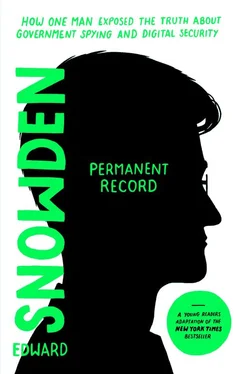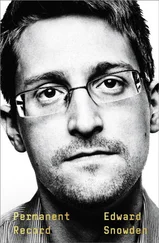Don’t worry if you think you don’t know a protocol from a hole in the wall. You’ve used them without knowing it. Think of protocols as languages for machines, the common rules they follow to be understood by one another. Every time you check your email, you use a language like IMAP (Internet Message Access Protocol) or SMTP (Simple Mail Transfer Protocol). And the time-setting procedure on your phone that I mentioned uses NTP (Network Time Protocol).
The takeaway is this: These protocols have given us the means to digitize just about everything. The internet has become almost as integral to our lives as the air through which so many of its communications travel. And to digitize something is to record it in a format that will last forever.
Here’s what strikes me when I think back to my childhood, particularly those first nine internet-less years: I can’t account for everything that happened back then, because I have only my memory to rely on. My generation is the last in American, and perhaps even in world, history whose childhoods aren’t up on the cloud. They’re mostly trapped in analog formats like handwritten diaries and Polaroid cameras. My schoolwork was done on paper with pencils and erasers, not on networked tablets that logged my keystrokes. My growth spurts weren’t tracked by smart-home technologies, but notched with a knife into the wood of the door frame of the house in which I grew up.
* * *
We lived in a grand old redbrick house on a little patch of lawn shaded by dogwoods and magnolias. Their flowers often served as cover for the plastic army men I used to crawl around with. The house had an atypical layout: Its main entrance was on the second floor, accessed by a massive brick staircase. This floor was the primary living space, with the kitchen, dining room, and bedrooms.
Above this main floor was a dusty, cobwebbed, and forbidding attic, haunted by what my mother promised me were squirrels, but what my father insisted were vampire werewolves that would devour any child foolish enough to venture up there. Below the main floor was a more or less finished basement.
My bedroom, which was part of an addition to the house, had a view of the den through a window in what had originally been the exterior wall of the house. This window, which once looked outside, now looked inside.
Though the window had a curtain, it didn’t provide much privacy. From as far back as I can remember, my favorite activity was to tug the curtain aside and peek through it into the den. Which is to say, from as far back as I can remember, my favorite activity was spying.
I spied on my older sister, Jessica, who was allowed to stay up later than I was and watch the cartoons that I was still too young for. I spied on my mother, who’d sit on the couch to fold the laundry while watching the nightly news. But the person I spied on the most was my father, who’d commandeer the den into the wee hours.
My father was in the Coast Guard. He sometimes wore a uniform and sometimes didn’t. He left home early and came home late, often with new gadgets, some of which he’d show me and some of which he’d hide. Which would you be more interested in?
The gadget that most caught my eye arrived one night just after I was supposed to be asleep. I was about to drift off when I heard my father’s footsteps coming down the hall. I stood up on my bed, tugged aside the curtain, and watched. He was holding a mysterious box the size of a shoebox, and he removed from it a beige object that looked like a cinder block. Long black cables snaked out of it like the tentacles of some deep-sea monster from one of my nightmares.
Working slowly and methodically—which was partially his disciplined, engineer’s way of doing everything and partially an attempt to stay quiet—my father untangled the cables and stretched one across the shag carpet from the back of the box to the back of the TV. Then he plugged the other cable into a wall outlet behind the couch.
Suddenly, the TV lit up, and with it my father’s face lit up, too. Normally, he spent his evenings sitting on the couch, cracking sodas and watching the people on TV run around a field, but this was different. My father was controlling what was happening on TV.
I had come face-to-face with a Commodore 64—one of the first home computer systems on the market.
At the time, I had no idea what a computer was, as they were not yet widespread like they are today. I knew only one thing: Whatever he was doing, I wanted to do it, too.
After that, whenever my father came into the den to break out the beige brick, I’d stand up on my bed, tug away the curtain, and spy on his adventures. One night I was truly confused by what he was doing—was it for fun or was it part of his job?—when I peeked through the window and saw him flying .
My father was piloting his own helicopter right there, right in front of me, in our den, on the TV screen. He took off from a little base, complete with a tiny waving American flag, into a black night sky full of twinkling stars, and then immediately crashed to the ground. He gave a little cry that masked my own, but just when I thought the fun was over, he was right back at the little base again with the tiny flag, taking off one more time.
The game was called Choplifter! and it was thrilling. Again and again the helicopter landed and lifted off as my father tried to rescue a flashing crowd of people and ferry them to safety. That was my earliest sense of my father: He was a hero.
The first time he landed that helicopter intact with a full load of miniature people, he cheered just a little too loud. His head snapped to the window to check whether he’d disturbed me, and he caught me dead in the eyes.
I leaped into bed, pulled up the blanket, and lay perfectly still as my father’s heavy steps approached my room.
He tapped on the window. “It’s past your bedtime, buddy. Are you still up?”
I held my breath. Suddenly he opened the window, reached in, picked me up—blanket and all—and pulled me through into the den. It all happened so quickly, my feet never even touched the carpet.
Before I knew it, I was sitting on my father’s lap as his copilot. I was too excited to realize that the joystick he’d given me wasn’t plugged in. All that mattered was that I was flying alongside my father.
Elizabeth City, North Carolina, is a quaint, midsize town built up around the banks of the Pasquotank River. My family has always been connected to the sea, my mother’s side in particular. Her heritage is straight Pilgrim—her first ancestor on these shores was John Alden, the Mayflower’ s cooper, or barrel maker. He became the husband of a fellow passenger named Priscilla Mullins, who was the only single woman of marriageable age onboard.
John and Priscilla’s daughter, Elizabeth, was the first Pilgrim girl born in New England. My mother, whose name is also Elizabeth (though she often goes by Wendy), is her direct descendant.
My maternal grandfather, whom I call Pop, is better known as Rear Admiral Edward J. Barrett. At the time of my birth he was deputy chief, aeronautical engineering division, Coast Guard Headquarters, Washington, DC. He’d go on to hold various engineering and operational commands. I wasn’t aware of how high up the ranks Pop was rising, but I knew that the welcome-to-command ceremonies became more elaborate as time went on, with longer speeches and larger cakes. I remember the souvenir I was given by the artillery guard at one of them: the shell casing of a 40 mm round, still warm and smelling like powdered hell, which had just been fired in a salute in Pop’s honor.
Then there’s my father, Lon, who at the time of my birth was a chief petty officer at the Coast Guard’s Aviation Technical Training Center in Elizabeth City, working as a curriculum designer and electronics instructor. He was often away, leaving my mother at home to raise my sister and me. To give us a sense of responsibility, she gave us chores; to teach us how to read, she labeled all our dresser drawers with their contents—socks, underwear. She would load us into our Red Flyer wagon and tow us to the local library. As a kid, my favorite section was the one that I pronounced “big masheens.” Whenever my mother asked me if I was interested in any specific “big masheen,” I was unstoppable: “Dump trucks and steamrollers and forklifts and cranes and—”
Читать дальше












